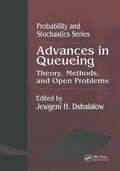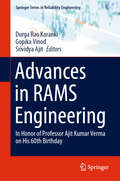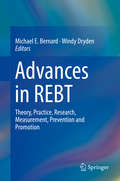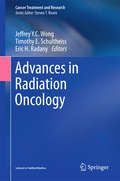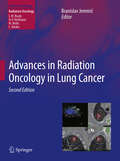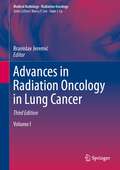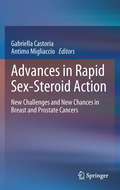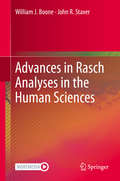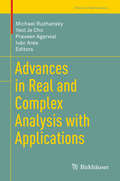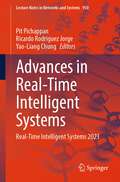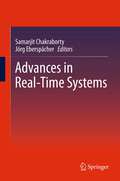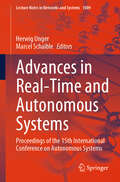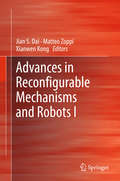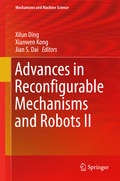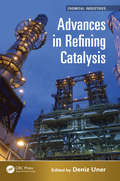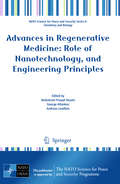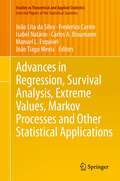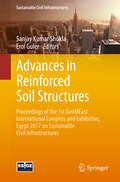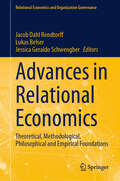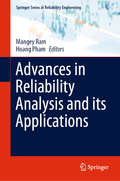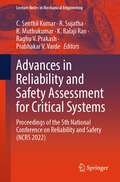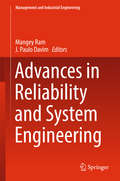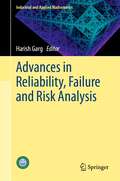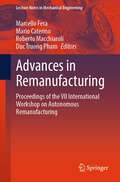- Table View
- List View
Advances in Queueing Theory, Methods, and Open Problems
by Jewgeni H. DshalalowThe progress of science and technology has placed Queueing Theory among the most popular disciplines in applied mathematics, operations research, and engineering. Although queueing has been on the scientific market since the beginning of this century, it is still rapidly expanding by capturing new areas in technology. Advances in Queueing provides a comprehensive overview of problems in this enormous area of science and focuses on the most significant methods recently developed.Written by a team of 24 eminent scientists, the book examines stochastic, analytic, and generic methods such as approximations, estimates and bounds, and simulation. The first chapter presents an overview of classical queueing methods from the birth of queues to the seventies. It also contains the most comprehensive bibliography of books on queueing and telecommunications to date. Each of the following chapters surveys recent methods applied to classes of queueing systems and networks followed by a discussion of open problems and future research directions.Advances in Queueing is a practical reference that allows the reader quick access to the latest methods.
Advances in RAMS Engineering: In Honor of Professor Ajit Kumar Verma on His 60th Birthday (Springer Series in Reliability Engineering)
by Srividya Ajit Durga Rao Karanki Gopika VinodThis book surveys reliability, availability, maintainability and safety (RAMS) analyses of various engineering systems. It highlights their role throughout the lifecycle of engineering systems and explains how RAMS activities contribute to their efficient and economic design and operation. The book discusses a variety of examples and applications of RAMS analysis, including: • software products; • electrical and electronic engineering systems; • mechanical engineering systems; • nuclear power plants; • chemical and process plants and • railway systems. The wide-ranging nature of the applications discussed highlights the multidisciplinary nature of complex engineering systems. The book provides a quick reference to the latest advances and terminology in various engineering fields, assisting students and researchers in the areas of reliability, availability, maintainability, and safety engineering.
Advances in REBT: Theory, Practice, Research, Measurement, Prevention and Promotion
by Michael E. Bernard Windy DrydenThis authoritative volume commemorates six decades of Rational Emotive Behavior Therapy by assembling its current state of theory, practice, and research. Bedrock chapters on defining features, assessment and measurement, and empirical findings place REBT squarely in the cognitive-behavioral landscape, reinforcing its status as a significant therapeutic approach. The book’s palette of applications shows the flexibility and effectiveness of REBT in school, workplace, and other settings, with worried parents and “stuck” athletes, and as a foundation for brief interventions. And the survey of guiding principles and the evolution of the method by REBT founder Albert Ellis is a testament to its enduring clinical value. Included in the coverage: · A comparison of REBT with other cognitive behavior therapies. · The measurement of irrationality and rationality. · Empirical Research in REBT theory and practice. · Rational Emotive Behavior Therapy and the working alliance. · Brief interventions in Rational Emotive Behavior Therapy. · REBT and positive psychology. · Rational emotive behavior education in schools. Advances in REBT will be welcomed as a definitive reference across the REBT community: frontline clinicians, novices, trainees, students, and researchers. Seasoned practitioners looking to incorporate REBT into their repertoires will find it immensely helpful.
Advances in Radiation Oncology (Cancer Treatment and Research #172)
by Jeffrey Y. C. Wong Timothy E. Schultheiss Eric H. RadanyThis book concisely reviews important advances in radiation oncology, providing practicing radiation oncologists with a fundamental understanding of each topic and an appreciation of its significance for the future of radiation oncology. It explores in detail the impact of newer imaging modalities, such as multiparametric magnetic resonance imaging (MRI) and positron emission tomography (PET) using fluorodeoxyglucose (FDG) and other novel agents, which deliver improved visualization of the physiologic and phenotypic features of a given cancer, helping oncologists to provide more targeted radiotherapy and assess the response. Due consideration is also given to how advanced technologies for radiation therapy delivery have created new treatment options for patients with localized and metastatic disease, highlighting the increasingly important role of image-guided radiotherapy in treating systemic and oligometastatic disease. Further topics include the potential value of radiotherapy in enhancing immunotherapy thanks to the broader immune-stimulatory effects, how cancer stem cells and the tumor microenvironment influence response, and the application of mathematical and systems biology methods to radiotherapy.
Advances in Radiation Oncology in Lung Cancer (Medical Radiology)
by Branislav JeremicThis is the second, completely updated edition of a comprehensive book in which many of the world's leading lung cancer specialists discuss the recent advances in the radiation oncology of lung cancer and reflect on the latest research findings. The first three sections cover the basic science of lung cancer, clinical investigations, including histology and staging, and a wide range of fundamental treatment considerations. Current treatment strategies for small cell and non-small cell lung cancer are then explained and evaluated in detail, with due attention to novel approaches that promise further improvements in outcome. The various types of treatment-related toxicity are discussed, and quality of life studies and prognostic factors are also considered. After evaluating the latest technological and biological advances, including IMRT, IMAT, cyber knife treatment, and tomotherapy, the book concludes by thorough consideration of specific aspects of clinical research in lung cancer.
Advances in Radiation Oncology in Lung Cancer (Medical Radiology)
by Branislav JeremićThis is the third, completely updated edition of a comprehensive book in which many of the world’s leading lung cancer specialists discuss the recent advances in the radiation oncology of lung cancer and reflect on the latest research findings in lung cancer and other intrathoracic malignancies. Lung cancer remains the major cancer killer in both sexes worldwide. It is so despite significant progress in recent decades in both diagnostic and treatment approaches. New biological and technological advances in this field are now faster incorporated in the overall decision-making process and are bringing fast and substantial improvements in both survivals and quality of life of lung cancer patients. Optimized patient-oriented approaches are reality of the third decade of this millennium and thoracic oncologists strive towards nothing but seamlessly delivering it in a continuous battle with lung cancer. The first three sections of the work cover the basic science of lung cancer, clinical investigations, including histology and staging, and a wide range of fundamental treatment considerations. Current treatment strategies for small cell and non-small cell lung cancer as well as other intrathoracic malignancies are then explained and evaluated in detail, with due attention to novel approaches that promise further improvements in outcome. The various types of treatment-related toxicity are discussed, and quality of life studies and prognostic factors are also considered. After evaluating the latest technological and biological advances, including stereotactic radiotherapy, and particle therapy, the book concludes by thorough consideration of specific aspects of clinical research in lung cancer. This concise yet comprehensive book is an invaluable resource for radiation oncologists.
Advances in Rapid Sex-Steroid Action: New Challenges and New Chances in Breast and Prostate Cancers
by Antimo Migliaccio Gabriella CastoriaBreast and prostate cancers are both hormone-dependent, at least in some stages of their progression. Hormonal manipulation represents an important therapeutic approach. Although most of breast and prostate cancers initially respond to hormone therapy, most tumors reinitiate to growth. Finally, hormone-resistant and metastatic breast and prostate cancers may develop. Thus, the challenge is the dissection of mechanisms by which steroid receptor signaling pathways continue to influence cell growth and invasiveness. Compelling evidence indicates that steroid hormones elicit non-genomic responses in extra-nuclear compartment of target cells. In this cellular location, steroid-coupled receptors rapidly recruit signaling effectors or scaffold proteins and activate multiple pathways leading to proliferation, survival, migration and invasiveness. The immediate challenge is the dissection of key events regulating the steroid response of target tissues to prevent progression and improve treatment of breast and prostate cancers.
Advances in Rasch Analyses in the Human Sciences
by William J. Boone John R. StaverThis volume follows the publication of Rasch Analysis in the Human Sciences. This new book presents additional topics not discussed in the previous volume. It examines key topics such as partial credit analysis of data, common person linking, computing equating constants, investigating discrimination, evaluating dimensionality, how to better utilize Wright Maps, how to design tests and surveys using Rasch theory, and many more. The book includes activities which can be used to practice the theme of each chapter and to test the reader’s understanding of Rasch techniques. Beginning and ending with a conversation between two students, each chapter provides clear step-by-step instructions as to how to conduct an analysis using the chapter theme. The chapters emphasize applications for the beginner learning Rasch and provide guidance for composing a write-up of an analysis for a presentation, paper, thesis or report.This book explores in detail many important yet often rarely discussed topics in Rasch. With its easy-to-read language and engaging format it reaches a wide audience of scientists, clinicians, students, researchers and psychometricians, providing a valuable toolkit for practical users of Rasch analysis. – Dr. Eva Fenwick, Clinical Research Fellow, Singapore Eye Research Institute (SERI) Assistant Professor, Duke-NUS Medical School, Singapore It is an easy to read book and provides immediate guidance for those wishing to conduct a Rasch analysis. The “conversations” between students in each chapter provides a welcome introduction to each topic. – Prof. Maik Walpuski, University Duisburg-Essen, GermanyThe lessons learned in their first book are extended by providing insightful demonstrations of some of the more complex concepts and techniques used in applying Rasch models. – Dr. Michael R. Peabody, National Association of Boards of Pharmacy, Illinois, USAI am amazed with the ability of these authors to communicate complicated knowledge, and the ability to make this highly complicated knowledge accessible to new learners guiding every step of the way. Through this book we get important knowledge about techniques and the different areas of use for Rasch methods in the human sciences This is truly an important book for students and researchers. – Prof. Charlotte Ringsmose, Aalborg University, Denmark
Advances in Real and Complex Analysis with Applications (Trends in Mathematics)
by Michael Ruzhansky Yeol Je Cho Praveen Agarwal Iván AreaThis book discusses a variety of topics in mathematics and engineering as well as their applications, clearly explaining the mathematical concepts in the simplest possible way and illustrating them with a number of solved examples. The topics include real and complex analysis, special functions and analytic number theory, q-series, Ramanujan's mathematics, fractional calculus, Clifford and harmonic analysis, graph theory, complex analysis, complex dynamical systems, complex function spaces and operator theory, geometric analysis of complex manifolds, geometric function theory, Riemannian surfaces, Teichm#65533;ller spaces and Kleinian groups, engineering applications of complex analytic methods, nonlinear analysis, inequality theory, potential theory, partial differential equations, numerical analysis , fixed-point theory, variational inequality, equilibrium problems, optimization problems, stability of functional equations, and mathematical physics. It includes papers presented at the 24th International Conference on Finite or Infinite Dimensional Complex Analysis and Applications (24ICFIDCAA), held at the Anand International College of Engineering, Jaipur, 22-26 August 2016. The book is a valuable resource for researchers in real and complex analysis.
Advances in Real-Time Intelligent Systems: Real-Time Intelligent Systems 2023 (Lecture Notes in Networks and Systems #950)
by Pit Pichappan Ricardo Rodriguez Jorge Yao-Liang ChungThe current information society is transitioning to an intelligent society where real-world and real-data applications have a profound influence. Real-time computing has an enormous impact on the future information society. Unimaginable applications have been emerging in real-time applications in the last two years. Logical reasoning and inference-making activities by machines have become a reality. Complex and heterogeneous data are being processed and infused into machine intelligence, bringing machine intelligence equal to human intelligence. Real-time data and real-time intelligence are the crux of the current research. This book of 41 papers in real-time intelligent systems addresses various issues ranging from real-time algorithms to various applications in real-time intelligence. The contributions of this book will mark a significant impact in the near-future research in real-time intelligence.
Advances in Real-Time Systems
by Jörg Eberspächer Samarjit ChakrabortyThis volume contains the lectures given in honor to Georg Färber as tribute to his contributions in the area of real-time and embedded systems. The chapters of many leading scientists cover a wide range of aspects, like robot or automotive vision systems or medical aspects.
Advances in Real-Time and Autonomous Systems: Proceedings of the 15th International Conference on Autonomous Systems (Lecture Notes in Networks and Systems #1009)
by Herwig Unger Marcel SchaibleThe 15th International conference on "Autonomous Systems" is addressing an important topic for computing systems and communication networks due to increasingly complex environments they are working in. Therefore, this conferences addresses methods and solutions enabling such systems to independently adapt themselves to changed environmental conditions, are able to learn from different sources and to process external requests dependably, safely and timely. The solutions presented here range from hardware to system design to individual applications. The book contains the results of the researchers presented at this conference, which is supported by GI (German Society of informatics) and other organisations Real-Time Systems Expert Committees. The target audience is students and researchers in computer science and automation technology, engineers, programmers and users of automation and communication systems.
Advances in Rechargeable Lithium–Sulfur Batteries (Modern Aspects of Electrochemistry #59)
by Arumugam Manthiram Yongzhu FuThis book presents the latest advances in rechargeable lithium-sulfur (Li-S) batteries and provides a guide for future developments in this field. Novel electrode compositions and architectures as well as innovative cell designs are needed to make Li-S technology practically viable. Nowadays, several challenges still persist, such as the shuttle of lithium polysulfides and the poor reversibility of lithium-metal anode, among others. However over the past several years significant progress has been made in the research and development of Li-S batteries. This book addresses most aspects of Li-S batteries and reviews the topic in depth. Advances are summarized and guidance for future development is provided. By elevating our understanding of Li-S batteries to a high level this may inspire new ideas for advancing this technology and making it commercially viable. This book is of interest to the battery community and will benefit graduate students and professionals working in this field
Advances in Reconfigurable Mechanisms and Robots I
by Matteo Zoppi Jian S Dai Xianwen KongAdvances in Reconfigurable Mechanisms and Robots I provides a selection of key papers presented in The Second ASME/IFToMM International Conference on Reconfigurable Mechanisms and Robots (ReMAR 2012) held on 9th -11th July 2012 in Tianjin, China. This ongoing series of conferences will be covered in this ongoing collection of books. A total of seventy-eight papers are divided into seven parts to cover the topology, kinematics and design of reconfigurable mechanisms with the reconfiguration theory, analysis and synthesis, and present the current research and development in the field of reconfigurable mechanisms including reconfigurable parallel mechanisms. In this aspect, the recent study and development of reconfigurable robots are further presented with the analysis and design and with their control and development. The bio-inspired mechanisms and subsequent reconfiguration are explored in the challenging fields of rehabilitation and minimally invasive surgery. Advances in Reconfigurable Mechanisms and Robots I further extends the study to deployable mechanisms and foldable devices and introduces applications of reconfigurable mechanisms and robots. The rich-content of Advances in Reconfigurable Mechanisms and Robots I brings together new developments in reconfigurable mechanisms and robots and presents a new horizon for future development in the field of reconfigurable mechanisms and robots.
Advances in Reconfigurable Mechanisms and Robots II (Mechanisms and Machine Science #36)
by Xianwen Kong Xilun Ding Jian S. DaiThis book presents the most recent advances in the research and applications of reconfigurable mechanisms and robots. It collects 93 independently reviewed papers presented at the Third ASME/IFToMM International Conference on Reconfigurable Mechanisms and Robots (ReMAR 2015) held in Beijing, China, 20-22 July 2015. The conference papers are organized into seven parts to cover the reconfiguration theory, topology, kinematics and design of reconfigurable mechanisms including reconfigurable parallel mechanisms. The most recent results on reconfigurable robots are presented including their analysis, design, simulation and control. Bio-inspired mechanisms are also explored in the challenging fields of rehabilitation and minimally invasive surgery. This book further addresses deployable mechanisms and origami-inspired mechanisms and showcases a wide range of successful applications of reconfigurable mechanisms and robots. Advances in Reconfigurable Mechanisms and Robots II should be of interest for researchers, engineers and postgraduate students in mechanical engineering, electrical engineering, computer science and mathematics.
Advances in Refining Catalysis (Chemical Industries)
by Deniz UnerTo meet changing market demands that have stringent emission standards and to ensure proper performance in refinery units, evaluation of novel catalyst designs and results from material characterization and testing of catalysts are of crucial importance for refiners as well as for catalyst manufacturers. This book highlights recent developments in the application of refinery catalysts in selected units such as fluid catalytic cracking (FCC), hydrogen production for hydroprocessing units, hydrotreating, hydrocracking, and sustainable processing of biomass into biofuels.
Advances in Regenerative Medicine: Role Of Nanotechnology And Engineering Principles (NATO Science for Peace and Security Series A: Chemistry and Biology)
by Andreas Lendlein George Altankov Venkatram Prasad ShastriThe contributions to this book, all written by leading experts in their respective disciplines, describe and explore the various facets of regenerative medicine and highlight the role of the "the nano length scale" and of "nano-scale systems" in defining and controlling cell and tissue environments. The development of novel tissue-regeneration strategies requires the integration of new insights emerging from studies of cell-matrix interactions, cellular signalling processes, and developmental and systems biology, into biomaterials design, ideally via a systems approach. The chapters cover a wide spectrum of topics ranging from stem cell biology, developmental biology, cell-matrix interactions, and matrix biology to surface science, materials processing and drug delivery. The book will be an especially valuable resource for researchers developing regenerative medicine paradigms that combine these facets into clinically translatable solutions.
Advances in Regression, Survival Analysis, Extreme Values, Markov Processes and Other Statistical Applications (Studies in Theoretical and Applied Statistics)
by Isabel Natário Manuel L. Esquível Frederico Caeiro João João Mexia João Lita da Silva Carlos A. BraumannThis volume of the Selected Papers from Portugal is a product of the Seventeenth Congress of the Portuguese Statistical Society, held at the beautiful resort seaside city of Sesimbra, Portugal, from September 30 to October 3, 2009. It covers a broad scope of theoretical, methodological as well as application-oriented articles in domains such as: Linear Models and Regression, Survival Analysis, Extreme Value Theory, Statistics of Diffusions, Markov Processes and other Statistical Applications.
Advances in Reinforced Soil Structures: Proceedings of the 1st GeoMEast International Congress and Exhibition, Egypt 2017 on Sustainable Civil Infrastructures (Sustainable Civil Infrastructures)
by Sanjay Kumar Shukla Erol GulerSoil reinforcement is a very useful technique to construct several cost-effective soil structures in an environmentally friendly and sustainable manner. The most commonly used reinforcement materials are galvanised steel strips, geosynthetics in the form of woven geotextiles, geogrids and geocomposites, and fibres from natural and waste products. In recent years, there have been advances in the area of soil reinforcement, especially in the utilization of the technique in field projects. The researchers have also been working to understand the behaviour of reinforced soil considering the field challenges of reinforced soil structures. This edited volume contains contributions on advances in reinforced soil structures, mainly flexible pavements, footings, embankments, stone columns/piles, and slopes, as covered in the subject areas of geosynthetic engineering and fibre-reinforced soil engineering. The first paper by Ioannis N. Markou presents the details of sand-geotextile interaction based on interface tests with conventional and large-scale direct shear equipment. The second paper by Atef Ben Othmen and Mounir Bouassida examines the interface properties of geosynthetic reinforcement by carrying out inclined plane tests under low confinement adapted to landfill covers conditions. The third paper by J. N. Jha, S. K. Shukla, A. K. Choudhary, K. S. Gill1 and B. P. Verma deals with the triaxial compression behaviour of soil reinforced with steel and aluminium solid plates in horizontal layers. The fourth paper by M. Muthukumar and S. K. Shukla describes the swelling and shrinkage behaviour of expansive soil blended with lime and fibres. The fifth paper by S. G. Shah, A. C. Bhogayata and S. K. Shukla provides the test results of shear strength of cohesionless soil reinforced with metalized plastic waste. The sixth paper by Bouacha Nadjet compares the geotextile-reinforced and geogrid-reinforced flexible pavements based on numerical analyses. The seventh paper by S. Kumar, C. H. Solanki, J. B. Patel, P. B. Sudevan and P. M. Chaudhary reports the results of laboratory model tests carried out on a square footing resting on prestressed geotextile reinforced sand. The eighth paper by Sanoop G and Satyajit Patel presents the numerical studies on ground improvement using geosynthetic reinforced sand layer. The ninth paper by ------------------- discusses the bearing capacity prediction of inclined loaded strip footing on reinforced sand by ANN. The tenth paper by Mohamad B. D. Elsawy presents the numerical simulation of an embankment, constructed on reinforced soft soil with conventional stone piles. The eleventh paper by N. O. Sheta and R. P. Frizzi deals with the analysis, design, construction and monitoring of a geosynthetics-reinforced-earth pile-supported embankment serving as an access road. The twelfth paper by S. Banerjee, A. Adhikari, S. Chatterjee and D. Das provides the details of a case study on reinforced slope on soft soil for the approach of a major bridge. We do hope the researchers and the engineers may find the contributions in this volume very useful. This volume is part of the proceedings of the 1st GeoMEast International Congress and Exhibition on Sustainable Civil Infrastructures, Egypt 2017.
Advances in Relational Economics: Theoretical, Methodological, Philosophical and Empirical Foundations (Relational Economics and Organization Governance)
by Jacob Dahl Rendtorff Jessica Geraldo Schwengber Lukas BelserThis book explores how economic and social values are created through dynamic, non-linear interactions within cooperative networks. Emphasizing the importance of relations and networks in value creation, the book discusses critical issues such as the relational nature of the firm, relational management and leadership as well as relational philosophy. This includes topics such as network models, stakeholder management, relational contracts, cooperative economics as well as philosophical questions related to relational ontology, epistemology and methodology, inter alia. Written by leading scholars, the contributions highlight the need for new business models and governance mechanisms that integrate resources across different economic and social systems, advocating for a relational approach to economic theory. In turn, the book argues for a network-based, integrative view of businesses, suggesting that economic success is increasingly dependent on the ability to navigate and foster complex relationships within a globalized context. Rich in theoretical and empirical insights, this book is essential reading for academics, policymakers, and business leaders interested in the future of economic thought and practice. It provides a comprehensive overview of the relational paradigm. The book is an invitation to join the conversation on how relational perspectives can transform our understanding of economics, governance, and organizational dynamics.
Advances in Reliability Analysis and its Applications (Springer Series in Reliability Engineering)
by Hoang Pham Mangey RamThis book presents the latest research in the fields of reliability theory and its applications, providing a comprehensive overview of reliability engineering and discussing various tools, techniques, strategies and methods within these areas. Reliability analysis is one of the most multidimensional topics in the field of systems reliability engineering, and while its rapid development creates opportunities for industrialists and academics, it is also means that it is hard to keep up to date with the research taking place. By gathering findings from institutions around the globe, the book offers insights into the international developments in the field. As well as discussing the current areas of research, it also identifies knowledge gaps in reliability theory and its applications and highlights fruitful avenues for future research. Covering topics from life cycle sustainability to performance analysis of cloud computing, this book is ideal for upper undergraduate and postgraduate researchers studying reliability engineering.
Advances in Reliability and Safety Assessment for Critical Systems: Proceedings of the 5th National Conference on Reliability and Safety (NCRS 2022) (Lecture Notes in Mechanical Engineering)
by R. Muthukumar R. Sujatha Raghu V. Prakash Prabhakar V. Varde C. Senthil Kumar K. Balaji RaoThis book comprises select proceedings of the 5th National Conference on Reliability and Safety (NCRS 2022). It provides comprehensive state-of-the-art research and development in diverse areas like reliability prediction, precursor event analysis, fuzzy reliability, structural reliability, passive system reliability, digital system reliability, risk informed approach to decision making, dynamic PSA, uncertainty and sensitivity modeling, among others. The book is a valuable resource for researchers and professionals working in both academia and industry in the areas of complex systems, safety critical systems and risk-based engineering.
Advances in Reliability and System Engineering: Solutions And Technologies (Management and Industrial Engineering)
by J. Paulo Davim Mangey RamThis book presents original studies describing the latest research and developments in the area of reliability and systems engineering. It helps the reader identifying gaps in the current knowledge and presents fruitful areas for further research in the field. Among others, this book covers reliability measures, reliability assessment of multi-state systems, optimization of multi-state systems, continuous multi-state systems, new computational techniques applied to multi-state systems and probabilistic and non-probabilistic safety assessment.
Advances in Reliability, Failure and Risk Analysis (Industrial and Applied Mathematics)
by Harish GargThis book collects select chapters on modern industrial problems related to uncertainties and vagueness in the expert domain of knowledge. The book further provides the knowledge related to application of various mathematical and statistical tools in these areas. The results presented in the book help the researchers and scientists in handling complicated projects in their domains. Useful to industrialists, academicians, researchers and students alike, the book aims to help managers and technical specialists in designing and implementation of reliability and risk programs as below: Ensure the system safety and risk informed asset management Follow a proper strategy to maintain the mechanical components of the system Schedule the proper actions throughout the product life cycle Understand the structure and cost of a complex system Plan the proper schedule to improve the reliability and life of the system Identify unwanted failures and set up preventive and correction action
Advances in Remanufacturing: Proceedings of the VII International Workshop on Autonomous Remanufacturing (Lecture Notes in Mechanical Engineering)
by Duc Truong Pham Marcello Fera Mario Caterino Roberto MacchiaroliThis book features the papers presented at IWAR 2023. The overall objective of the event was to bring together international scientists and engineers to bridge the academic and industrial worlds in the field of remanufacturing. Various themes related to remanufacturing, including methods for operations management, methodologies for quality assessment and life cycle assessment, the integration of robots in remanufacturing, and the use of modern I4.0 technologies in a remanufacturing context among others were addressed. This book is intended for academics, graduate students, researchers, as well as industrial practitioners engaged in the field of remanufacturing.
